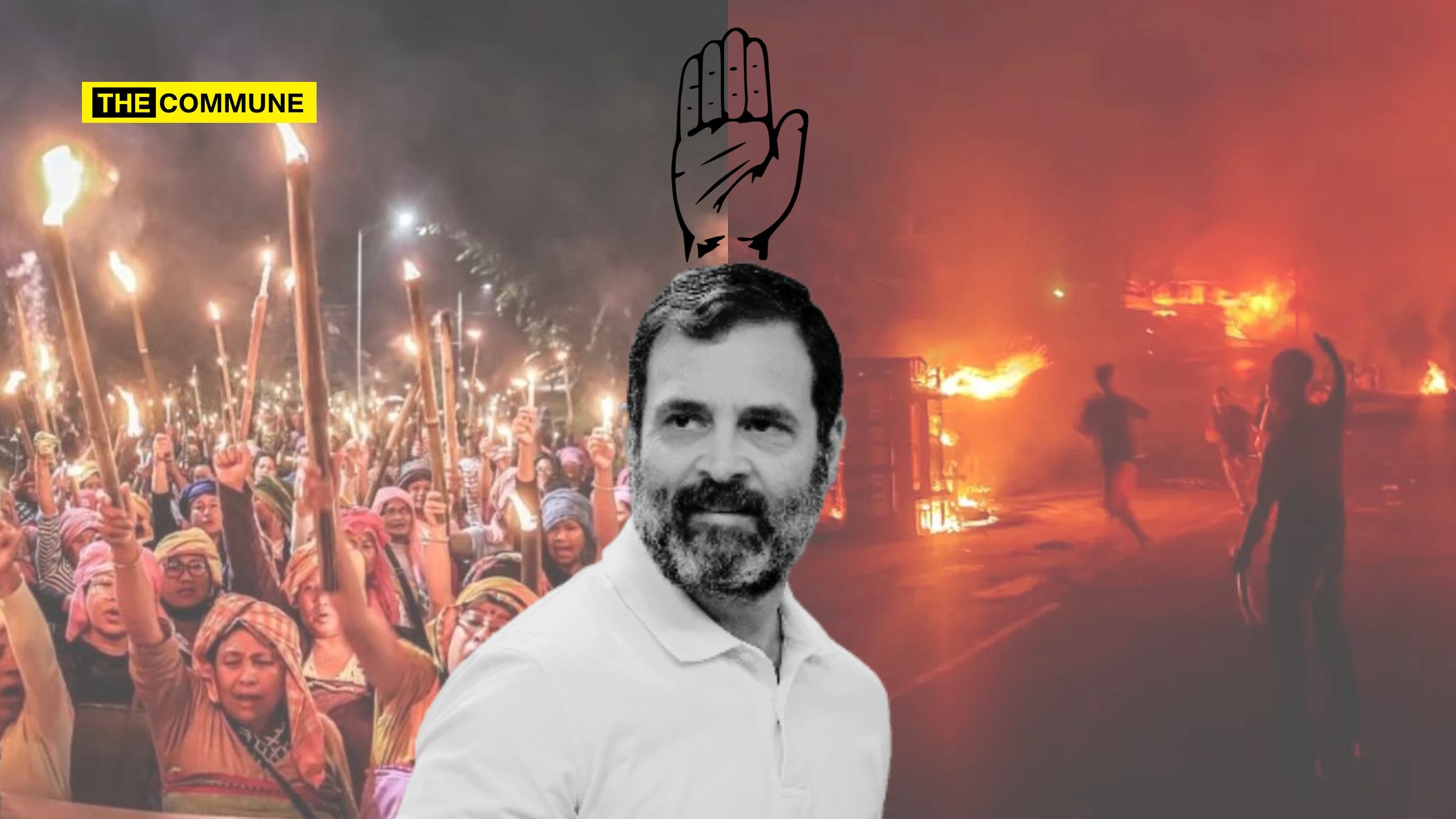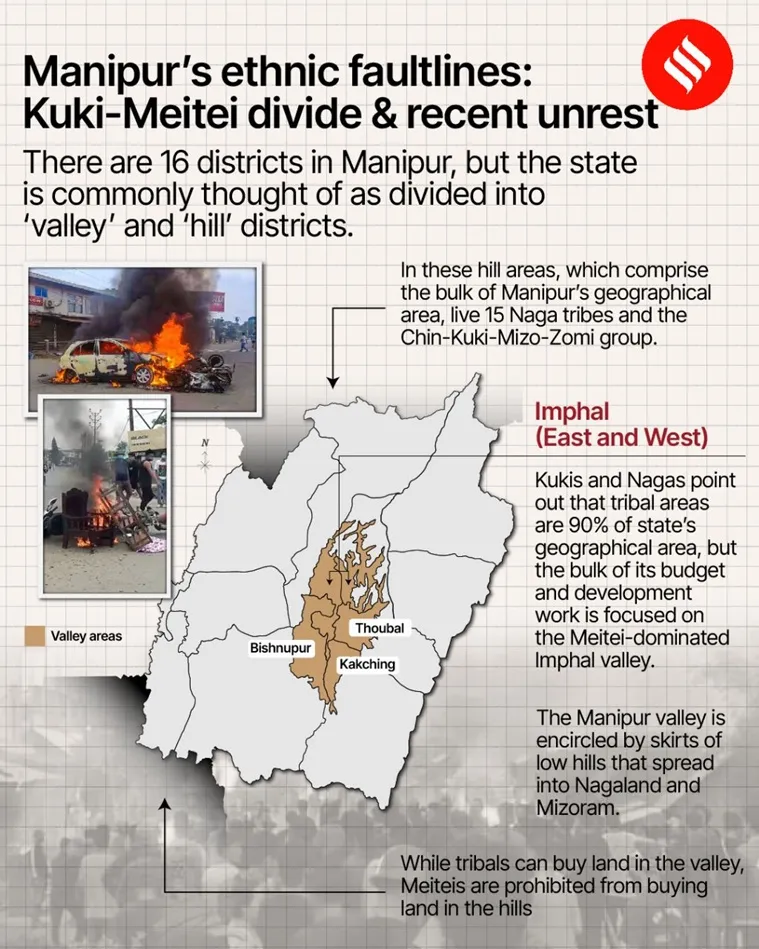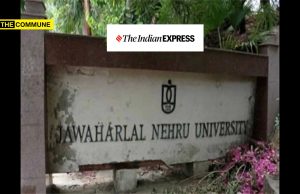
Leader of the Opposition in the Lok Sabha and Congress scion Rahul Gandhi’s recent visit to Manipur have sparked a political debate. His visit has been criticized by the BJP that it was merely about pouring oil into the already raging flame.
On 8 July 2024, Rahul Gandhi visited relief camps in Manipur to support those displaced by the ongoing ethnic violence. Numerous videos and photos captured him interacting with individuals at the camp in Tuibong village, Churachandpur district. After Gandhi went to the Jiribam Higher Secondary School relief camp to offer his support. He was scheduled to meet Governor Anusuiya Uikey at 5:30 PM and address a press conference at the Manipur Congress office at 6:15 PM. However, during the press conference, Gandhi abruptly left following a heated exchange with journalists.
Previously, Gandhi had criticized Prime Minister Narendra Modi for avoiding the press, but he chose to avoid difficult questions, stating, “Please respect what I am saying. I have come here to give a clear message; I am not interested in answering questions that are designed to divert the issue. I have made my statement,” before leaving the press conference.
#WATCH | Imphal, Manipur: When asked questions by reporters after his press conference, Lok Sabha LoP and Congress MP Rahul Gandhi says, "…Please respect what I am saying. I have come here to give a clear message, I am not interested in answering questions that are designed to… pic.twitter.com/bmOxdbEohT
— ANI (@ANI) July 8, 2024
The criticism intensified after Gandhi abandoned a press conference and avoided answering challenging questions. But why is Rahul Gandhi so desperately raking up the issue of Manipur in order to attack the Modi government? There’s a historical context to it.
Ethnic Composition And Historical Context of Manipur
Manipur’s geographical features significantly influence its socio-political landscape. The state is divided into 16 districts, categorized into “valley” and “hill” districts. The Imphal Valley, located centrally and surrounded by hills, represents about 10% of the state’s landmass. This valley, dominated by the non-tribal Meitei community, is accessed by four major highways, two of which are critical lifelines for the state. The Meitei community, which makes up over 64% of Manipur’s population, holds 40 out of 60 legislative seats. In contrast, the hills cover nearly 90% of the state’s area, inhabited by various recognized tribes who are represented by only 20 MLAs.

(Image Credit: IE)
Historically, the valley districts of Thoubal, Bishnupur, Kakching, Imphal East, and Imphal West were a part of the ancient kingdom of Kangleipak, ruled by the Ningthouja dynasty. While some historians assert that the tribal areas outside the valley were also under this kingdom, this is contested by the tribes, particularly the Naga tribes. The kingdom, a British protectorate, faced frequent attacks from the northern Nagas. To protect the valley, the British introduced the Kuki-Zomi from Burma’s Kuki-Chin hills as a buffer against the Nagas. The Kukis, fierce warriors similar to the Nagas, were settled along the ridges to shield the valley.
Immediate Trigger For The Violence
Since 2012, there has been an ongoing demand led by the Scheduled Tribes Demand Committee of Manipur (STDCM) for Scheduled Tribe (ST) status for the Meitei community. The Meitei Tribe Union argued that the Meiteis, once recognized as a tribe before Manipur’s merger with India in 1949, lost their tribal status after the merger. They seek ST status to preserve their land, culture, and language, citing marginalization from 59% of the population in 1951 to 44% in 2011.
On 19 April 2023, the Manipur High Court directed the state government to submit a decade-old recommendation to the Union Tribal Affairs Ministry for including the Meitei community in the ST list. This order referenced a 2013 letter from the Union Tribal Ministry requesting recommendations, including the latest socio-economic and ethnographic reports.
The Meitei ST status demand has faced strong opposition from other tribal groups. These groups argue that the Meiteis already have demographic and political advantages and are more advanced academically. They fear that granting ST status could lead to loss of employment opportunities for tribals and enable Meiteis to acquire land in the hills, displacing the tribals. Tribal organizations, such as the All Tribal Students’ Union of Manipur, also contend that the Meiteis’ language is included in the Eighth Schedule of the Constitution and that many Meiteis already benefit from SC or OBC status.
Recent unrest in Manipur intensified following the Manipur High Court’s 19 April 2024 directives, with the All Tribal Students’ Union of Manipur organizing a “Tribal Solidarity March” against the Meitei ST status demand. This march led to violent clashes, prompting the deployment of the Indian Army and other central forces. The state government issued “shoot at sight” orders in extreme cases to control the violence.
Other contributing factors to the unrest include growing tensions between the Meiteis and tribes like the Kukis, disputes over state government notices declaring certain villages as illegal settlements, concerns about the delimitation process, and the impact of the Myanmar military coup causing a refugee crisis. Additionally, there are allegations of a sudden increase in villages in Churachandpur district and claims that some tribal groups are obstructing anti-drug efforts.
The ethnic conflict between the Meiteis and hill communities has roots in the historical kingdom of Kangleipak and escalated with the rise of the Naga national movement in the 1950s. This led to insurgency among the Meiteis and Kuki-Zomi. By the 1990s, as the NSCN-IM pushed for Naga self-determination, the Kukis began to militarize, leading to the “Kukiland” movement and a rift between the Kukis and Meiteis.
The Supreme Court has deemed the Manipur crisis a “humanitarian problem,” emphasizing that only the President can designate a community as ST. The Chief Justice of India has urged the Centre and the Manipur government to protect the people. The Union Home Minister stated that the court’s order would be reviewed with stakeholders before any decisions are made. Meanwhile, the Indian Army has increased surveillance using UAVs and helicopters to monitor the situation and the Indo-Myanmar border.
Congress’ Blunder Leading To The Kuki Militancy’s Role
The recent surge in violence in Manipur has been allegedly attributed to the actions of Kuki militant groups. The immediate catalyst for the unrest was the expiration of the Suspension of Operations (SoO) agreement with 25 Kuki-Zomi militant factions. Despite the agreement’s expiration, the Ministry of Home Affairs (MHA) has yet to announce whether it will be extended. Reports indicate that the Central Government has not decided on renewing the SoO agreement amidst growing demands from political parties and civil society organizations in Manipur to end the pact. So, what is this agreement?
Originally established in 2005 under the UPA-I regime, the SoO agreement was formalized on 22 August 2008, as a tripartite accord involving the Government of India under former Union Home Minister P Chidambaram, the Government of Manipur, and Kuki-Zomi militant groups represented by the Kuki National Organisation (KNO) and the United People’s Front (UPF). The KNO comprises 17 Kuki-Zomi militant groups, while the UPF includes eight. The insurgents who have signed this agreement in 2008 get a stipend of ₹6,000 every month to help in their rehabilitation, but they were unaccounted for.
After the agreement in September 2008, leaders from the central committee of the Young Mizo Association (YMA) engaged in discussions with the ZRA and the Hmar People’s Conference-Democracy (HPC-D) in Churachandpur. They urged these groups not to disrupt the upcoming elections for the 40-member Mizoram legislature. However, violence resumed in 2010. The ZRA members involved in smuggling of ammunition into the area and arrested for possessing weapons, even carried out extorting money from the public and government employees to fund their group. To address the unrest, Union Home Minister P. Chidambaram visited the ZRA’s designated camp at Singhat in Churachandpur District on 15 December 2010. Spending about 45 minutes there, he noted the positive attitude of the cadres and their eagerness to initiate political dialogue. Chidambaram acknowledged improvements in the law and order situation in Manipur, with a reduction in killings, but emphasized the need for strict measures against extortion and kidnapping. He warned that achieving lasting peace would require time.
Despite the then Home Minister Chidambaram’s assurance that the ZRA displayed a willingness to initiate dialogue, a team from the Assam Rifles apprehended 17 alleged ZRA members along with a substantial cache of arms and ammunition in Churachandpur District. The seized weapons included 15 AK assault rifles with 28 magazines, three hand grenades, three wireless transmission sets, 1,355 AK ammunition rounds, and two live M-16 rifle rounds. On 25 January 2012, seven militants were arrested in Churachandpur District for their attempts to disrupt the assembly elections and intimidate voters in the Thanlon and Tipaimukh constituencies. On 23 October 2011, the CBI filed charges against three ZRA cadres for their involvement in the fraudulent withdrawal of INR 4.54 crores from the UBI Churachandpur branch in October 2009.
The continuous influx of illegal migrants from Myanmar into Manipur has been ongoing for a significant period. These migrants, accepted as militants, have contributed to a growing population that is housed by Kuki chiefs, officials, and SoO militant groups in available lands such as Reserve and Protected Forests, protected sites, and wildlife sanctuaries. This has led to encroachment, deforestation, and other illegal activities.
The current Suspension of Operation (SoO) pact has fostered a favorable environment for strengthening militant groups. These groups are responsible for bringing in Kuki migrants from Myanmar, offering them language and combat training in their camps, and utilizing illegal migrants as labor for poppy cultivation, arms trafficking, and drug smuggling.
Since the SoO agreement in 2008, crores of rupees have been spent on stipends, and the public continues to face extortion and intimidation. The Rules of Engagement (RoE) hinder security forces from detecting violations by the SoO groups.
The current crisis is attributed to terrorism by Kuki militant groups funded by narco-money and supported by Kuki policymakers and officials, using illegal migrants as soldiers. This has led the Meiteis to demand the abrogation of the SoO.
Manipur Violence 2023
Violence erupted on 3 May 2023, when Kuki-Zomi militants launched attacks on the Meitei community in Manipur’s Churachandpur and Bishnupur districts, setting fire to their homes. In response, numerous civil society organizations have called for the abrogation of the SoO agreement. Thousands of women protested across Imphal Valley on 28 February 2024, demanding the termination of the SoO pact. These protests included sit-ins during the day and torch rallies at night, organized by the Coordinating Committee on Manipur Integrity (COCOMI), a coalition of five valley-based civil society groups.
The escalating pressure led the 5th Session of the 12th Manipur Legislative Assembly to pass a unanimous resolution on February 29, urging the Central Government to completely revoke the SoO agreement with all Kuki-Zomi militant groups. Manipur Chief Minister Nongthombam Biren confirmed this resolution, stating it was aimed at restoring peace and security in the region.
Despite this, the 10 MLAs from Kuki-Zomi-Hmar tribes, including two ministers, have boycotted the Assembly sessions since the outbreak of violence. Previously, on 10 March 2023, the Manipur Government had unilaterally withdrawn from the SoO agreement with two Kuki-Zomi groups, the Kuki National Army (KNA) and the Zomi Revolutionary Army (ZRA), citing escalating violence and illegal rallies.
The MLAs from Kuki-Zomi-Hmar tribes criticized the Assembly’s resolution, claiming it was motivated by prejudice and a lack of consideration for the Joint Monitoring Group (JMG), which is responsible for overseeing adherence to the SoO agreement. They argue that the resolution was influenced by bias rather than actual violations reported by the JMG.
COCOMI, in its letter to Prime Minister Narendra Modi dated 26th February, urged caution against hastily extending the SoO agreement with Kuki-Zomi militant groups. They highlighted repeated violations of the agreement’s ground rules and expressed concerns over increased violence and illegal activities by these groups, including attacks on Indian Army and state police personnel. The COCOMI letter cited specific incidents, such as Kuki-Zomi militants participating in violent rallies, hoisting militant flags, and engaging in the narcotics trade. It also noted a significant rise in poppy cultivation in SoO territories and irregularities in reporting casualties, further exacerbating the conflict.
In addition, the Meitei Alliance, representing various Meitei organizations, submitted a memorandum to the Union Home Minister on 21 February 2024, questioning the continuation of the SoO agreements due to perceived threats to national security. The Alliance accused Kuki-Zomi militants of exploiting the SoO pact to undermine India’s security, particularly following armed attacks and public displays of sophisticated weaponry during peace marches.
Since 2017, the N. Biren Singh government in Manipur has been striving to address the region’s issues through legal and administrative measures aimed at achieving a permanent resolution rather than temporary fixes. However, the process has been complicated by opposition interference and the influence of pressure groups. In this volatile climate, the actions of political leaders, civil society organizations, and government bodies will be crucial in shaping Manipur’s future stability. Effectively addressing both the immediate and root causes of unrest is essential for restoring peace and ensuring equitable governance. For lasting peace, it is vital that political interference, militant activities, and pressure group influences are minimized, allowing for a balanced and constructive resolution to the conflict in Manipur.
(With Inputs From IE & Imphal Review)
Subscribe to our channels on Telegram, WhatsApp, and Instagram and get the best stories of the day delivered to you personally.




